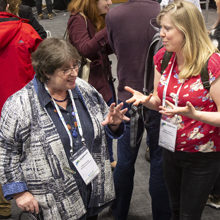Celebrating International Volunteer Day
05 December 2019

This International Volunteer Day we would like to thank everyone who has volunteered and contributed to another great year for the Society and the microbiology community.
Each year we welcome people from the microbiology community who volunteer their time to support both the Microbiology Society and the field of microbiology. Without their efforts, support and dedication it would not be possible to bring together and empower communities that shape the future of microbiology and the Microbiology Society.
Governance
The Society is governed by volunteers who form the Society's governing board, the Council. These volunteers support the direction and remit of the organisation to enable it to function. On 1 January 2020 we will also welcome a new group of elected members to Council.
Engagement
Our members also support many aspects of the Society’s work. They have assisted with media enquiries, blogged about events they have attended or organised, contributed to our podcast Microbe Talk, contributed to our videos flagging key research and activities, and reviewed books and submitted articles to our member magazine, Microbiology Today.
Empowering members to represent the Society on external committees is also central to what we do. This provides opportunities for volunteers to attend meetings and events they may not otherwise be involved in, such as parliamentary events. We also work with volunteers who are not members, who dedicate their time as journal editors and reviewers, and volunteers who form organising committees ensuring we host successful events throughout the year.
Building communities
An explicit goal in the Society’s strategy is to increase the involvement of groups of microbiologists who are not currently well represented. One of those groups comprises of microbiologists with an interest in clinical and health-related areas. In February this year, a number of member volunteers met to discuss what more could be done. Since then, we have hosted the Federation of Infection Societies (FIS), collaborated with the Healthcare Infection Society (HIS) to host a one-day workshop called Bridging the clinical-research gap and as a result have more volunteers working in the clinical and health-related areas involved.
In March, President Professor Judith Armitage launched the first event of her UK and Ireland tour in Leeds, followed by events in Newcastle, Dublin, Plymouth and Reading. Without the dedicated local support of volunteers and our Champions these events would not have been such a success.
What our volunteers say:
“I joined the Microbiology Society (…) to be part of a wider community of microbiologists. The Microbiology Society supported me to attend my first conference, present my first poster and oral presentation, deliver my first outreach project, participate in my first microbiology-related working group and will soon be supporting me to co-chair my first session at a national conference. I have previously been in a number of societies, but I have found the Microbiology Society to be the most engaged with its members and offering development opportunities and support – particularly for early career scientists.
Member Dr Benjamin Johns is a Trainee Clinical Scientist at Public Health Wales, based at the University Hospital of Wales in Cardiff and part of the Clinical and health-related microbiology working group.
“The Microbiology Society has been a fantastic organisation in helping me in my career. I have served as a Journal Editor, as General Secretary of the Society, and I inaugurated the Society’s microbial physiology section. Now as an Honorary Member it is a privilege to be able to help others. My role so far has involved helping inexperienced editors reach decisions with difficult manuscripts, especially where two referees disagree. It is a pleasure to be able to interact with young editors who are keen to help authors improve their manuscripts.”
Member Professor Jeff Cole is an Emeritus Professor at the University of Birmingham. Jeff is an Honorary member and currently an Editor Mentor for Access Microbiology.
“Membership of the Society enabled me to take on the role of Policy Representative, which is helping me learn a lot about science policy as well as building professional contacts outside microbiology. These opportunities are very important in my professional journey and the contributions of the Microbiology Society are significant”
Dr Yinka Somorin is based at Queens University Belfast and is a member of the Society. Yinka, is a Champion and is the Society’s External Representative for the POST in Northern Ireland.
“Volunteering as Editor for Microbiology has helped me hone my own paper-writing skills. It has provided me the opportunity to read about some fantastic advances in the field, both in and outside of my specialism, and has considerably improved my network. I’ve also benefitted from discounted attendance at the Annual Conference.”
Non-member Dr Louise Horsfall is a Senior Lecturer and EPSRC Early Career Fellow at the University of Edinburgh. Louise currently volunteers as an Editor for our flagship journal Microbiology.
Visit Mi Society to find out more about current opportunities available to members of the Society and how you can get involved during our 75th anniversary in 2020. If you are not a member and would like to know more about how you can get more involved, please contact Erin Taylor, Member Engagement Manager.
